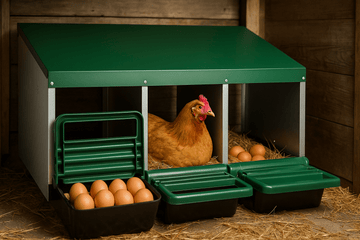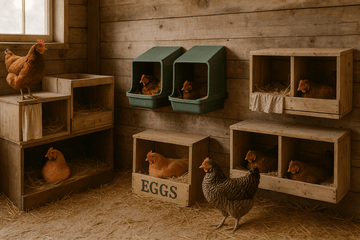Introduction: Egg-Eating Chickens—a Frustrating Issue!
If you're a backyard chicken keeper, discovering that your hens have started eating their own eggs can feel downright frustrating. This habit quickly escalates, leading to fewer eggs for you and more headaches managing your flock. But here’s the good news: the solution might be simpler than you think—a well-designed nest box. That's right! The nest box isn’t just about giving your hens comfort; it can also deter egg-eating behaviors. Curious how? Let’s dive right in!
Why Do Chickens Eat Eggs Anyway?
Before fixing a problem, it helps to understand why it occurs. Chickens don’t start eating eggs randomly. Usually, there's a trigger like boredom, stress, dietary deficiencies, or accidental breakage. Sometimes, it’s simply curiosity; once hens get a taste, the habit sticks. Imagine it as your chickens developing a sweet tooth—once they find something tasty, they'll keep returning unless something intervenes.
Dietary Issues and Deficiencies
A common cause of egg-eating is nutritional deficiency. Chickens lacking calcium or protein might instinctively seek these nutrients, turning to their eggs as an easy source. If your hens' diet is low in essential minerals or proteins, eggs become an irresistible supplement. Checking and adjusting your flock’s diet can prevent this entirely. Provide calcium-rich grit or oyster shells, and maintain a balanced feed to avoid this issue.
Stress and Overcrowding
Stressful environments push hens toward unwanted behaviors. Think about it—if you lived in cramped, noisy conditions, you'd probably develop some unwanted habits too! Overcrowding or an unsuitable coop environment often causes hens to act out. Adjusting your coop and nesting areas can help reduce stress significantly, curbing egg-eating behaviors.
What Makes a Nest Box “Right”?
Now, let’s focus on the nest box. Surprisingly, this simple feature can hugely influence your hens’ behavior. A proper chicken laying box offers comfort, privacy, protection, and even psychological safety. Chickens prefer laying in quiet, dark, and secure spots. Think of your nest boxes as cozy bedrooms—they should feel safe, private, and comfortable enough to discourage wandering behaviors that lead to egg-eating.
Ideal Nest Box Dimensions and Design
The perfect nest box typically measures around 12 inches by 12 inches. Provide adequate space but avoid overly spacious boxes; chickens prefer snug environments. Boxes that are too big can encourage egg rolling, leading to breakage and subsequent egg-eating. Choose nesting materials like straw, wood shavings, or shredded paper—anything soft yet absorbent and comfortable for hens.
The Importance of Privacy and Darkness
Hens naturally seek dark, quiet places to lay their eggs. Brightly lit or exposed areas cause discomfort and anxiety, prompting hens to peck at their eggs. Nest boxes that are slightly enclosed or placed in quiet, low-traffic areas encourage hens to lay and move on quickly, reducing opportunities to peck at eggs out of curiosity or stress. Consider adding curtains or a flap to your nest boxes for extra privacy, dramatically reducing egg-eating episodes.
Elevation Matters
Ever noticed hens prefer elevated nesting areas? It’s not random; instinctively, hens seek out safe locations, away from predators and disturbances. Elevated nest boxes help hens feel secure, meaning they’re less likely to peck or eat eggs. Even a slight elevation, about 18 inches off the ground, can significantly enhance your chickens’ sense of security.
Types of Nest Boxes to Prevent Egg-Eating
The type of nest box you choose directly influences your hens' habits. The right design prevents eggs from breaking or rolling around, minimizing the chances that hens will start the habit of egg-eating.
Roll-Away Nest Boxes
If egg-eating is already a problem, roll-away nest boxes are a game-changer. These boxes gently guide eggs away immediately after laying, reducing the chance of accidental or intentional breakage. Eggs roll into a separate compartment inaccessible to hens—out of sight, out of mind. Imagine removing temptation entirely—that’s exactly how roll-away boxes work!
Community vs. Individual Nest Boxes
Community nest boxes—larger, shared spaces—sometimes increase competition, stress, and breakage. Individual boxes usually work better in controlling egg-eating behaviors. With individual boxes, hens don’t have to fight for nesting space or worry about overcrowding. Less competition means fewer broken eggs and fewer temptations.
Managing Your Nest Boxes Effectively
Maintaining your nest boxes matters as much as choosing the right type and location. Dirty or cluttered boxes lead to increased egg breakage, stress, and more frequent egg-eating.
Regular Cleaning and Maintenance
Regularly inspect and clean nest boxes to remove old bedding, dirt, and parasites. Chickens will naturally avoid laying eggs in filthy areas and may start laying elsewhere, increasing egg breakage chances. Regular maintenance includes weekly cleanings and bedding changes, ensuring the nest boxes are always inviting.
Egg Collection Frequency
Collecting eggs frequently is crucial. The longer eggs remain unattended, the higher the chance of pecking, breaking, and eating. Ideally, eggs should be collected twice daily, especially if egg-eating behavior has previously been noted. Regular egg removal disrupts this cycle and drastically reduces the chances of recurrence.
Inspecting and Repairing Nest Boxes
Damaged nest boxes, with sharp edges or broken walls, encourage egg breakage. Hens might peck out of curiosity or discomfort. Conduct regular inspections and promptly fix any issues. Keep boxes smooth, comfortable, and safe to avoid accidental egg breakage.
Training Chickens to Use the Nest Boxes Properly
Believe it or not, chickens sometimes need guidance to use nest boxes effectively. You can't just throw a box into the coop and expect immediate compliance—especially if your hens have developed bad egg-eating habits already. Like training a pet, you’ll need consistency, patience, and a few clever tactics.
Introducing Nest Boxes Early
Introduce nest boxes early—ideally before your hens even begin laying eggs. Chickens develop habits quickly, and getting them used to the boxes beforehand helps establish a strong routine. If you're introducing older hens to new boxes, ensure you place dummy eggs or golf balls in the boxes to encourage them to lay in the proper place. This method mimics natural egg-laying behavior, encouraging them to follow suit without developing bad habits.
Using Dummy Eggs Effectively
Dummy eggs, fake eggs made from plastic, ceramic, or even wooden materials, simulate real eggs. They help hens understand where eggs should be laid and discourage pecking by causing mild frustration if they attempt to break them. Imagine pecking something repeatedly without reward—it quickly becomes dull! Dummy eggs train hens to recognize that nest boxes are exclusively for laying, not snacking.
Positive Reinforcement Techniques
Use positive reinforcement by rewarding your hens when they use the nest boxes appropriately. Small rewards like treats, praise, or additional free-range time after laying an egg in the correct place reinforce good behaviors. Chickens respond remarkably well to positive reinforcement, quickly learning which behaviors earn them treats and rewards.
Common Mistakes to Avoid with Nest Boxes
Avoiding common mistakes is just as critical as implementing good practices. Knowing what to avoid can save you significant time, money, and frustration in managing your flock.
Incorrect Placement
Positioning matters. Nest boxes placed in areas of high foot traffic, bright sunlight, or noisy environments deter hens from using them. Instead, they'll lay eggs elsewhere or get stressed and develop egg-eating habits. Always locate your boxes in quiet, shaded, low-traffic areas inside your coop. This strategy helps hens feel safe and calm, promoting healthier laying behavior.
Insufficient Nest Boxes
Too few nest boxes create competition, stress, and aggression among hens, increasing the likelihood of broken or eaten eggs. The general guideline is to provide at least one nest box for every three to four hens. It prevents overcrowding, reducing stress significantly, and eliminating a major trigger for egg-eating behavior.
Poor Quality Nesting Material
Using poor-quality bedding can lead to egg breakage and increased egg-eating. Avoid materials that compact easily, retain moisture, or are abrasive. Quality nesting material like clean straw or pine shavings helps keep eggs intact, dry, and clean, significantly reducing accidental breakages.
Additional Strategies to Complement Nest Boxes
Sometimes, nest boxes alone aren't enough. Here are extra strategies to consider, complementing your nest boxes effectively.
Improving Overall Diet and Health
Diet is crucial. Ensure your hens have ample calcium and protein to discourage egg-eating driven by nutritional deficiencies. Provide balanced commercial feed with occasional treats like leafy greens, mealworms, or calcium-rich supplements. Healthy, well-fed hens rarely develop egg-eating tendencies.
Providing Enrichment and Entertainment
Bored hens are troublemakers—plain and simple. They peck out of boredom or curiosity, often breaking and eating eggs accidentally or intentionally. Provide enrichment, such as hanging treats, perches, dust baths, or toys. A busy hen is less likely to develop problematic behaviors, significantly reducing the likelihood of egg-eating.
Addressing Aggressive Behavior Immediately
Aggressive or dominant hens often trigger stressful coop dynamics leading to egg-eating behaviors. Identifying and isolating aggressive hens or reintroducing them gradually after addressing underlying causes can restore harmony in your flock. Balanced flock dynamics greatly reduce egg breakage and eating incidents.
Monitoring and Adjusting Nest Box Strategies
Every flock is unique. Regularly monitoring and adapting your strategies is essential. Pay attention to changes in your hens' behaviors, egg production patterns, and egg conditions. Regular adjustments ensure ongoing success in preventing egg-eating behaviors.
Observe and Record Behavior
Observing and recording your flock's behavior regularly helps you identify emerging issues early. Track egg-laying patterns, locations, conditions of eggs, and behavioral changes. The sooner you detect a problem, the easier it is to fix—saving you from prolonged headaches down the line.
Periodic Adjustments to Setup
Don't be afraid to experiment. Periodically adjust the nest boxes, their locations, or bedding materials to find what suits your flock best. Small tweaks often make significant differences in comfort and stress levels, helping hens remain productive and healthy.
Seeking Professional Advice
When in doubt, consult a poultry expert or veterinarian. Professional advice can offer valuable insights into why egg-eating persists, providing tailored strategies to combat it effectively. It’s always better to seek help than struggle endlessly with recurring problems.
Preventative Measures for Long-Term Success
Prevention, as they say, is better than cure. Rather than waiting for egg-eating habits to start, proactive measures will save you a lot of headaches. Incorporate these practices early, ensuring your hens never pick up bad habits in the first place.
Creating a Calm Environment
Ensure your coop environment is calm and stress-free. Loud noises, frequent disturbances, or predator threats trigger anxiety, leading hens to destructive behaviors like egg-eating. Use insulation or soundproofing techniques if necessary, and ensure predator-proofing to maintain a peaceful atmosphere. A calm hen is a productive and trouble-free hen!
Regular Health Checks
Regularly conduct health checks on your flock to spot potential problems early. Hens experiencing discomfort due to parasites, illness, or injury might start pecking eggs out of stress or nutritional desperation. Routine health checks help keep hens healthy, minimizing behavioral issues significantly. It’s much easier to maintain a healthy flock than to correct problematic behaviors later.
Balancing Flock Dynamics
Keep an eye on flock hierarchy. Dominant hens sometimes stress others, increasing anxiety and egg-eating behavior. If necessary, separate aggressive birds temporarily to restore harmony. Regularly re-assessing and maintaining balanced flock dynamics prevents many behavioral issues, including egg-eating.
Signs Your Nest Box Strategy is Working
Knowing if your efforts are paying off is critical. Here’s what to look out for as signs of successful nest box strategies.
Consistent Egg Production
Consistent egg production is the clearest indicator of success. If your hens regularly lay eggs without breaks, it indicates a comfortable, low-stress environment. Frequent egg collections with minimal breakage or missing eggs signify you're on the right path!
Reduced Egg-Eating Incidents
Fewer or no signs of broken shells or missing eggs confirm your nest boxes are working effectively. Noticeable declines in egg-eating behavior mean your hens are happier, healthier, and better managed, showing you’ve hit the right combination of environment, nutrition, and nest box design.
Improved Flock Behavior
Hens showing less stress or aggression indicate your strategies are effective. Peaceful interactions, less fighting, and calm demeanor among hens mean you’re successfully providing the right nesting conditions. Happy hens mean a happier flock owner, saving time and stress in daily coop management.
Conclusion: Nest Boxes as Your Secret Weapon
Egg-eating behaviors, while frustrating, are entirely manageable with the right nest box strategies. The secret lies in creating an optimal environment, ensuring dietary balance, maintaining cleanliness, and choosing nest boxes thoughtfully. By proactively managing your flock's comfort and reducing temptation, you can eliminate egg-eating entirely, leaving you with a stress-free, productive backyard flock.
Egg-eating habits aren’t inevitable—they're preventable and manageable. Use the right nest boxes and management strategies to turn a stressful situation into a distant memory. Your hens—and your egg basket—will thank you!
FAQs (Frequently Asked Questions)
1. Can egg-eating behaviors be completely stopped once they start?
Yes, with consistent management and the right nesting strategies, you can entirely eliminate egg-eating behaviors. However, patience and consistency are critical.
2. Are roll-away nest boxes always necessary?
Not always, but roll-away boxes significantly reduce egg-eating habits by removing temptation immediately after laying. They're especially useful if you already have a problem.
3. How many nest boxes do I need for my chickens?
Generally, provide at least one nest box for every three to four hens to avoid overcrowding and competition.
4. Does diet really affect egg-eating behaviors?
Absolutely! Nutritional deficiencies, particularly calcium and protein, significantly influence hens to peck and eat their eggs. Maintaining a balanced diet prevents this issue effectively.
5. What’s the best nesting material to prevent egg breakage?
Soft, absorbent materials like straw, pine shavings, or shredded paper help reduce egg breakage by cushioning eggs effectively.






